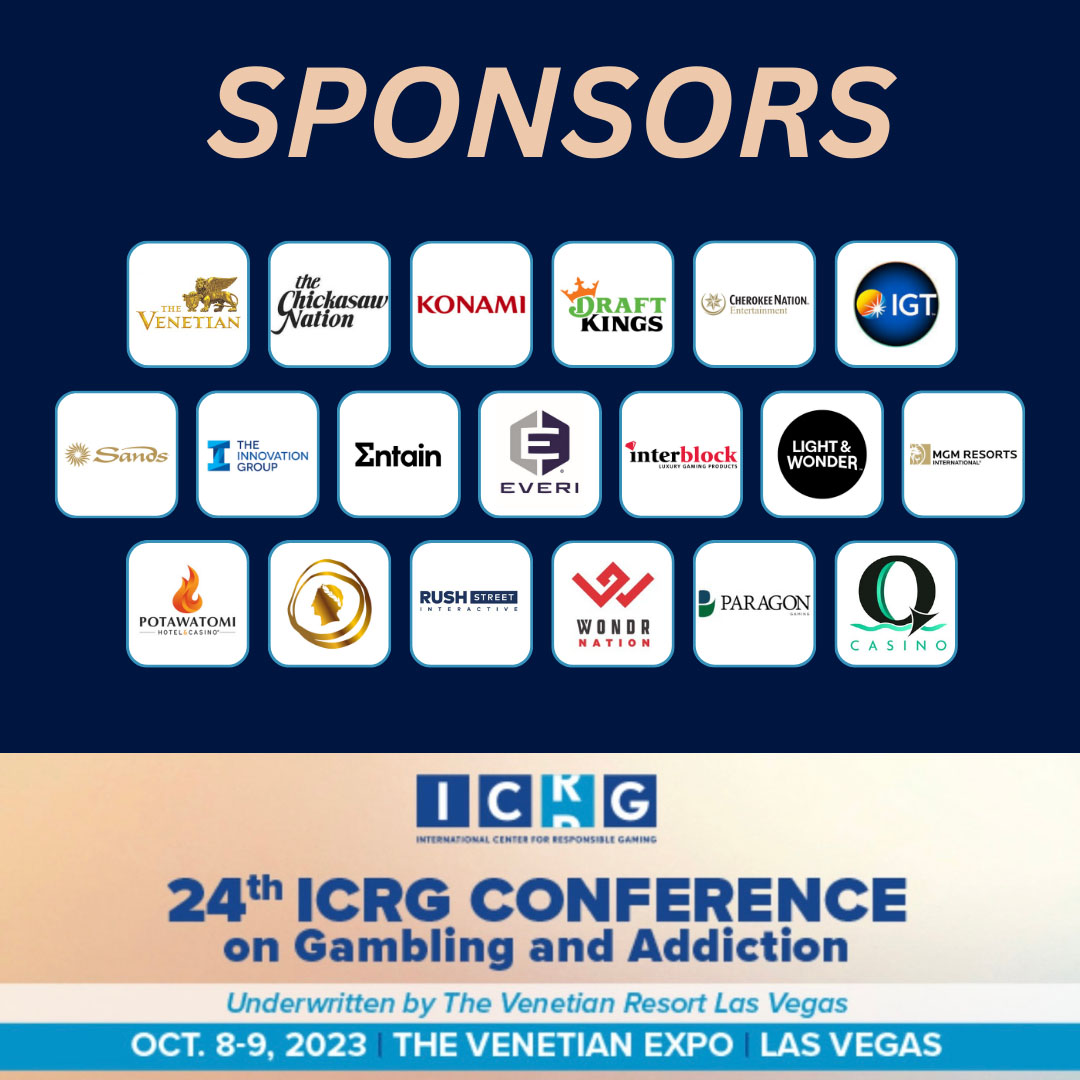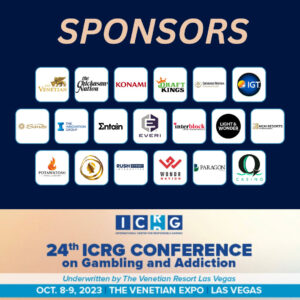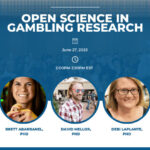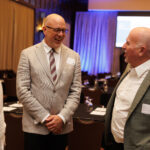
Brochure
The ICRG Conference on Gambling and Addiction brochure contains a full schedule, information on registration and fees, a list of agencies that have approved the conference for continuing education hours or CLE’s, a list of speakers, instructions for submitting poster abstracts and scholarship applications and our generous sponsors.
24th-ICRG-Conference-on-Gambling-and-Addiction PDF Brochure
Schedule and Learning Objectives
Note that the following schedule includes learning objectives for each session.
SUNDAY, OCTOBER 8, 2023
8 a.m. – 5 p.m. Registration
10 a.m. – NoonPre-Con workshop for Treatment Providers: Mindfulness-Based Relapse Prevention for Gambling Problems
Shane Kraus, PhD, Assistant Professor of Psychology, University of Nevada, Las Vegas
Mindfulness-based relapse prevention (MBRP) is a form of treatment for addiction that focuses on the period after treatment when individuals are most likely to relapse. MBRP applies the concept of mindfulness to the management of urges that can derail sobriety or maintain moderation. Dr. Kraus, both a researcher and a clinician, will lead this workshop in an exploration of the utility of MBRP for clients with a gambling disorder.
Learning objectives – As a result of the program, attendees will be able to:
• Learn how to teach mindfulness to clients.
• Apply Mindfulness-based relapse prevention in their practice.
Pre-Con Workshop for Treatment Providers: Congruence Couple Therapy for Gambling Disorder
Speaker Bonnie Lee, PhD, Professor in the Addictions Counselling Program and Research Affiliate, University of Lethbridge
Identifying mechanisms of change in psychotherapeutic treatment models has significant implications for addictive disorders. Dr. Lee will discuss her research showing that Congruence Couple Therapy can have better outcomes than individual-based therapies for clients with gambling problems.
Learning objectives –As a result of the program, attendees will be able to:
• Identify mechanisms of change in psychotherapeutic treatment
• Describe the principles of Congruence Couple Therapy.
• Apply Congruence Couple Therapy in practice.
1 p.m. Welcome
1:15 – 2:15 p.m. The Institutional Bias Against People with Gambling Disorder
Speaker: Stacey Tovino, JD, PhD, William J. Alley Professor of Law, The University of Oklahoma College of Law
Moderator: Alan Feldman, International Gaming Institute, University of Nevada, Las Vegas
Despite the reclassification of gambling disorder as an addictive disorder by the American Psychiatric Association in 2013, health insurers continue to exclude gambling disorder treatment from insurance coverage. Furthermore, federal and state disability non-discrimination laws uniformly exclude gambling disorder from the definition of disability. Dr. Tovino will detail her findings on this disturbing situation and propose how the gambling community can rectify this situation.
Learning objectives –As a result of the program, attendees will be able to:
• Identify biases in health care law that prevent people with gambling disorder from accessing help.
• Describe the argument for treating gambling disorder the same as other addictive disorders.
• Formulate strategies for addressing this problem.
2:30 – 3:30 p.m.Ask Me Anything! Voices of Recovery from Gambling Disorder
Ted Hartwell, Executive Director, Nevada Council on Problem Gambling; Ed Talbot, Executive Director, New Hampshire Council on Problem Gambling; Michelle Malkin, PhD, JD, Assistant Professor, East Carolina University, Kathy Scanlan, International Center for Responsible Gaming (moderator)
What is the experience of individuals who recover from gambling disorder? This free-wheeling session will allow audience members to set the agenda!
Learning objectives –As a result of the program, attendees will be able to:
• Describe the varied experiences of recovery from gambling disorder.
• Apply knowledge of the recovery experience to clinical practice, research or responsible gambling policies.
3:30 – 3:50 p.m.Refreshment Break
3:50 — 4:50 pm.Does Responsible Gambling Work? New Research on Pre-commitment
Speaker: Michael J.A. Wohl, PhD, Professor, Carleton University
Moderator: Cait DeBaun, American Gaming Association
Does pre-commitment—a responsible gambling strategy that allows the gambler to set spending and time limits before gambling—help reduce gambling problems? Dr. Wohl’s ICRG-funded research explored the uptake and effectiveness of the PlayMyWay program.
Learning objectives –As a result of the program, attendees will be able to:
• Describe the rationale behind pre-commitment as responsible gambling strategy.
• Critically analyze the research on pre-commitment.
• Incorporate findings into prevention programs.
5 – 6 p.m. Optimizing responsible gaming programs: Using the Positive Play approach to measure responsible play, identify program success, and pinpoint areas for improvement
The presentation will describe the research results involving the Positive Play Scale (PPS) as well as the early development of the PPS Lottery scale. The presentation will also describe the development and initial research results of the Positive Play Quiz.
Speaker: Nassim Tabri, PhD, Carleton University
Moderator: Kate Carlson, Director of CSR & Compliance, Hoosier Lottery
Learning objectives –As a result of the program, attendees will be able to:
• Describe the principles of Positive Play.
• Critically analyze research on Positive Play.
• Incorporate insights into responsible gambling programs.
6:15 – 8 p.m.Reception and Poster Session
MONDAY, OCTOBER 9, 2023
7 – 8 a.m. OPEN AA/GA MEETING
All are welcome to this open meeting.
NETWORKING BREAKFAST FOR ALL ATTENDEES
8 – 9 a.m.The Gamblers of the Future? Migration from Video Games to Gambling among Young Adults
Speaker: Luke Clark, PhD, Professor of Psychology, University of British Columbia
Moderator: Martin Lycka, SVP American Regulatory Affairs & Responsible Gambling, Entain
In video games, a loot box is a consumable virtual item which can be redeemed. Studies have shown a link between loot box engagement and gambling problems. However, the causal connections are unknown. Dr. Clark will report on his longitudinal research that traced the migration from video games to gambling.
Learning objectives –As a result of the program, attendees will be able to:
• Learn the difference between causation, correlation and association in research studies.
• Describe the similarities and differences between loot boxes and gambling.
• Consider how prevention programs can be developed to address this problem.
9:15 – 10:15 a.m.Adolescents and the Lottery
Speaker: Zu Wei Zhai, PhD, Assistant Professor, Program in Neuroscience, Middlebury College
Moderator: Connie Jones, Director of Responsible Gaming, AGEM
Lottery-purchasing is prevalent among adolescents. A study found that lottery-purchasing by this demographic is linked to later gambling problems. Dr. Zhai will report on this research and propose ways to address this problem.
Learning objectives –As a result of the program, attendees will be able to:
• Describe the prevalence of adolescent gambling on the lottery.
• Critically assess research on lottery play by adolescents.
• Consider which findings can be applied to new prevention and responsible gambling programs.
10:15 – 10:40 a.m.Refreshment Break
10:45 –11:45 a.m.Gambling Disorder and Stigma: Opportunities for Treatment and Prevention
Leanne Quigley, PhD, Assistant Professor of Psychology, Yeshiva University
We all know that people with gambling problems and addiction face stigma in today’s society. But what is the real-life impact of stigma and how can we change such attitudes? Dr. Quigley will do a deep dive, reporting on her research on the impact of stigma on treatment, recovery and public health policies focused on people with gambling disorder.
Learning objectives –As a result of the program, attendees will be able to:
• Assess the damage caused by stigma against people with gambling disorder.
• Apply findings to reform existing recovery and public health policies.
Noon – 1 p.m.Awards Luncheon
Concurrent Special Interest Tracks
Track for Clinicians, Researchers and Public Health Professionals
1 – 2 p.m.Integrative Cultural Healing Model
Speaker: Martina Whelshula, PhD, Arrow Lakes Nation of the Colville Confederated Tribes in Washington State
Moderator: Katherine Spilde, PhD, MBA, Endowed Chair, Sycuan Institute on Tribal Gaming and Professor, L. Robert Payne School of Hospitality & Tourism Management, San Diego State University; Member of ICRG Board
Dr. Whelshula has worked extensively with Native American communities nationwide on local and national policy development, education and behavioral health. Her most recent work is the development of an integrative cultural treatment model to address trauma, mental health, and substance use disorders for tribes.
Learning objectives –As a result of the program, attendees will be able to:
• Critically assess the need for culture-based approaches to trauma, mental health and addiction among members of Tribal nations.
• Apply principles of an integrative cultural treatment model in clinical practice.
Track for Industry Professionals and Regulators
1-2 p.m.Cashless Gambling: Exploring Health Risks and Empowering Consumer Protection
Luke Clark, PhD., Professor of Psychology, University of British Columbia
Kasra Ghaharian, PhD, Postdoctoral Research Fellow,University of Nevada, Las Vegas
Moderator: Omer Sattar, Co-Founder and Co-CEO of Sightline Payments
The evolution of payment technologies has raised questions about the health impact on customers who might be having problems with their gambling. This session will feature some of the newest research on “cashless gambling.”
Learning objectives –As a result of the program, attendees will be able to:
• Describe the current state of digital payments in the gambling environment.
• Critically assess the research currently being done on the impact of digital payments in gambling establishments.
• Apply findings to improve responsible gambling strategies.
Track for Clinicians, Researchers and Public Health Professionals
2:10 – 3:10 p.m. Lightning Talks: Recovery from Gambling Disorder: What we know and what we don’t know
● Samuel Peter, PhD., Durham VA
● David Hodgins, PhD, University of Calgary
● Shane Kraus, PhD, University of Nevada, Las Vegas
● Ted Hartwell, Nevada Council on Problem Gambling
● Rory Pfund, PhD, University of Memphis
Moderator: Christine Reilly, International Center for Responsible Gaming
There is no standard treatment for or road to recovery from gambling disorder. The panel will deliver brief reports on where we stand with research on various approaches such as mindfulness, CBT, brief interventions, contingency management, and Gamblers Anonymous.
Learning objectives –As a result of the program, attendees will be able to:
• Discover the current status of research on various treatments and other pathways to recovery from gambling disorder.
• Describe why research on treating people with gambling disorder is difficult to conduct.
• Apply insights about various treatments to clinical practice.
Track for Industry Professionals and Regulators
2:10 – 3:10 p.m. Lightning Talks: Can we improve responsible gambling messaging?
Speakers: Michael Wohl, PhD, Carelton University; Brett L.Abarbanel, PhD, International Gaming Institute, UNLV, Garrett Farnes, MGM Resorts International; Gloria Miele, PhD, UCLA; Deirdre Querney, MSW, Hamilton Alcohol, Drug & Gambling Services; Peter Cohen, The Agenda Group (moderator)
Low usage of responsible gambling (RG) programs has led many to wonder if the messaging is to blame. The panel will deliver brief reports on what the research tells us and ideas for improving language in RG programs.
Learning objectives –As a result of the program, attendees will be able to:
• Describe the concerns of researchers, treatment providers and responsible gambling specialists about the potentially stigmatizing language of responsible gambling.
• Translate what we know about de-stigmatizing addiction treatment language to responsible gambling messaging.
3:10 – 3:30 p.m.Refreshment Break
3:30 – 4:30 p.m.Plenary Session: Trajectories of Sports Wagering Over Time
Speaker: Joshua Grubbs, PhD, Associate Professor, University of New Mexico
Moderator: Michael Soll, The Innovation Group
What are the latest findings from this ICRG-funded national survey of sports wagering? Join Dr. Grubbs for an exploration of sports gamblers in the U.S. and their potential health risks.
Learning Objectives — As a result of the program, attendees will be able to:
• Differentiate between the different types of sports wagering available in the U.S. as of 2023
• Describe the demographic and socioeconomic predictors of sports wagering behaviors.
Plenary Session:
4:45 – 6:15 p.m. Trends Shaping the Future of Responsible Gaming
Speaker: Jeremiah Weinstock, PhD, Professor, Clinical Program and Department Chair, Saint Louis University
Moderator: Alan Feldman, UNLV
How will technology shape tomorrow’s prevention and interventions for gambling problems? Dr. Weinstock will reflect on his own work with an mHealth app and other developments he sees on the horizon.
Learning Objectives – As a result of the program, attendees will be able to:
• Describe the various ways in which technology is being used in mental health care and prevention.
• Critically assess the type of research that must be done to evaluate new technology-based interventions and responsible gambling programs.
• Describe the pros and cons of AI in treatment and prevention.
Continuing Education
UPDATE as of October 26, 2023: We are waiting for the final registration/scanned badges list so that we can email attendees a link to SurveyMonkey. Please note that attendees must complete the evaluation on SurveyMonkey in order to receive a CE certificate. Questions? Contact Noelle Mancini (nmancini@icrg.org).
Conference attendees can earn up to 13.50 continuing education hours approved by healthcare and legal certifying agencies.
2 Hours
Pre-Con Workshop for Treatment Providers:
- Mindfulness-Based Relapse Prevention for Gambling Problems; or
- Congruence Couple Therapy for Gambling Disorder
11.50 Hours
Sessions held Sunday afternoon through Monday afternoon.
Agencies that have approved ICRG as a CE Provider
- The International Center for Responsible Gaming is approved by NAADAC, the Association for Addiction Professionals, to offer continuing education (Provider # 100793)
• The International Center for Responsible Gaming is approved by NBCC, National Board of Certified Counselors, as an Approved Continuing Education Provider, ACEP No. 6474. Programs that do not qualify for NBCC credit are clearly identified. The ICRG is solely responsible for all aspects of the programs.
• The International Center for Responsible Gaming (ICRG) is approved by the American Psychological Association to sponsor continuing education for psychologists. The ICRG maintains responsibility for this program and its content
Single Program Approval
- The IGCCB has approved the ICRG Conference for 13.25 hours (C-0-115).
- The Nevada Board of Continuing Legal Education has approved the ICRG Conference for 13 credits.
- This program is approved by the National Association of Social Workers (Approval # 886911286-4174) for 13.5 continuing education contact hours.
- The Pennsylvania CLE Board has approved the conference for 13.5 CLEs.
- The State of Nevada Board of Examiners for Alcohol, Drug and Gambling Counselors has approved the ICRG Conference for 13.5 hours (Approval code: 2023-0728)
The ICRG also is seeking single program approval of the conference from the following organizations, most of which have approved CE hours offered by previous ICRG conferences and webinars: Canadian Problem Gambling Certification Board, the Nevada Board of Examiners for Social Workers, and the Nevada Certification Board.
(Please contact Christine Reilly at creilly@icrg.org if you wish to receive CLEs from other jurisdictions.
Visit icrg.org/events to get updates on CE and CLE approvals.)
Speakers
Brett L. Abarbanel, PhD, Executive Director, International Gaming Institute, University of Nevada, Las Vegas
Luke Clark, PhD, Professor of Psychology, University of British Columbia
Garrett Farnes, Director of Responsible Gaming, MGM Resorts International
Alan Feldman, Distinguished Fellow in Responsible Gaming, University of Nevada, Las Vegas, and Chair Emeritus, ICRG
Kasra Ghaharian, PhD, Postdoctoral Research Fellow, University of Nevada, Las Vegas
Joshua Grubbs, PhD, Associate Professor, University of New Mexico
Ted Hartwell, Executive Director, Nevada Council on Problem Gambling
David Hodgins, PhD, Professor, Department of Psychology, University of Calgary
Shane Kraus, PhD, Assistant Professor of Psychology, University of Nevada, Las Vegas
Bonnie Lee, PhD, Professor in the Addictions Counseling Program and Research Affiliate, University of Lethbridge
Mark Lipparelli, Chairman, ICRG
Michelle Malkin, PhD, JD, Assistant Professor, East Carolina University
Arthur Paikowsky, President, ICRG
Samuel Peter, PhD, Clinical Staff Psychologist, Durham VA Health Care System
Rory Pfund, PhD, Research Assistant Professor, Department of Psychology, University of Memphis
Leanne Quigley, PhD, Assistant Professor of Psychology, Yeshiva University
Nassim Tabri, Ph.D., Associate Professor, Department of Psychology, Carleton University
Ed Talbot, Executive Director, New Hampshire Council on Problem Gambling
Stacey Tovino, JD, PhD, William J. Alley Professor of Law, The University of Oklahoma College of Law
Jeremiah Weinstock, PhD, Professor, Clinical Program and Department Chair, Saint Louis University
Martina Whelshula, PhD, Arrow Lakes Nation of the Colville Confederated Tribes in Washington State
Michael J.A. Wohl, PhD, Professor, Carleton University
Zu Wei Zhai, PhD, Assistant Professor, Program in Neuroscience, Middlebury College
Sponsors

Elite: Chickasaw Nation and Konami
Exclusive: DraftKings
Premier: Cherokee Nation Entertainment, IGT, Sands, and The Innovation Group
Strategic: Entain, Everi, Interblock Gaming, Light & Wonder, MGM Resorts International, and Potawatomi Hotel & Casino
Advocate: Caesars Entertainment, Rush Street Interactive, and Wondr Nation
Honor Roll: Paragon Gaming and Q Casino
THANK YOU TO OUR SPONSORS!!!
There are still opportunities for your organization to join these generous companies demonstrating their support for responsible gambling by serving as a sponsor of the ICRG Conference on Gambling and Addiction. Current sponsors are listed in the conference brochure. Please contact Joshua Belkin at jbelkin@icrg.org for more information
Fees & Registration

For help with registration, contact Keli Elkins (kelkins@icrg.org) or Christine Reilly (creilly@icrg.org)
Poster Session
Abstracts Due August 15, 2023
The ICRG showcases new research on gambling disorder and responsible gambling during a poster session and reception held at the ICRG Conference. This event is an opportunity for investigators to report on their empirical research and discuss their findings with conference attendees. Each year, a committee selects the recipients of the Outstanding Poster Award and honorable mention.
SUBJECT MATTER
Posters can focus on any aspects of gambling disorder and responsible gambling and must report on empirical research. Abstracts will be reviewed for scientific merit.
SUBMISSION GUIDELINES
Abstracts should be submitted electronically in MS Word® or another word processing software using a font size no smaller than 12 pt. PDFs will not be accepted. Please include the following information:
• Title of Presentation
• Name(s) and affiliation(s) of the author(s)
• Email address of the first author
• Poster abstract (no more than 500 words). Please follow APA format for text and references. The abstract should address the following:
• Sample and methods
• Preliminary findings
• Implications for the field
• Digital signature of first author certifying that any work with human or animal subjects in the abstract complies with the guiding policies and principles for experimental procedures of the World Medical Association of Helsinki.
By submitting a poster, at least one author must agree to attend the conference and to participate in the poster session on October 8. No individual can be first author on more than one submission.
Abstracts will be accepted on a rolling basis until Aug. 15, 2023. Send the abstract to Christine Reilly at creilly@icrg.org. For more information or questions, call 978-338-6610.




